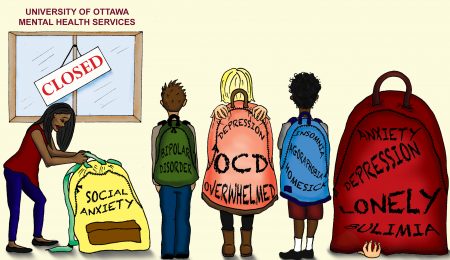Is 101-Week really such an important part of the student experience?
Frosh week is embedded in popular culture as one of the most memorable moments of a student’s time at university. Images of students and their families swarming campus the weekend before classes start, freshman mingling with their peers in matching t-shirts, and group photos in front of campus landmarks are plastered all over university promotional material with hopes of drawing more students to the school in the coming years.
Getting to know your way around campus, meeting future classmates, moving into residence halls, and shedding any inhibitions from your high school self are all connotations of the typical frosh week stereotype.
For many, welcome week, frosh, 101-Week, or whatever ongoing campus event is occurring, it is an exciting time to be on campus.
Gearing up for a new chapter in their lives, freshmen students partake in the events and workshops hosted by their new school, all with the hopes of getting familiarized with their new environment and meeting those who they will be sharing that space with.
With the transition to mostly online programming this year, there arises an opportunity to take a closer look at the traditional frosh experience, and how this year’s shake-up provides a valuable frame for constructive criticisms.
Does frosh really provide students with the social foundations for their next few years at university, or does the hype overshadow the reality of its impact?
Frosh at the U of O
At the University of Ottawa, 101-Week is hosted between the University of Ottawa Students’ Union and numerous student associations. The first two days of the week are largely reserved for 101-week kit sales and icebreaker activities. Campus is flooded with students from Tabaret lawn to Minto, while music blares from any given direction.
In many ways, the University of Ottawa produces a stereotypical frosh week.
As one of the few universities in Ontario that has a “wet frosh”, U of O hosts many events for freshmen over the course of the week that take students over the border to Gatineau, where the legal drinking age is 18. These events, usually held in the evenings, largely consist of loud music, dark venues, and a lot of drinking.
Though the university provides these opportunities, it claims not to endorse irresponsible alcohol consumption, just to provide a safe environment where students can socialize in familiar ways.
Despite these types of activities being included in the schedule, the U of O maintains that this week is to be called “101 Week”, not frosh. This stance could be criticized as one of mere optics, where the university administration wants to distance themselves from the negative connotations of “frosh”, but have not made substantive changes in the events hosted as a part of the week.
Positive student experience
Many students cherish their 101-Week experience. Danica Weir, a fifth-year co-op student spoke positively about her frosh week in 2016, saying it was an overall great experience. The events she attended hosted by the student union or the Development Student Association were typically full of new students and student leaders who were eager to be a part of the event.
Over the course of the week, she immediately met and clicked with a group of people in her program, who then became a tight-knit group of friends, eventual roommates and project partners in the future. This element of expanding her social network so rapidly was the real highlight of 101-Week for Wier, who has maintained many of the connections she made in her first week throughout her years studying.
When asked if she would recommend taking part in 101-Week to an incoming U of O student, Wier was encouraging but recognized that the experience is catered to those who feel comfortable in new and dynamic social situations.
“Someone who doesn’t love being in that kind environment might be overwhelmed and not enjoy their time,” she went on to point out how the intensity of the week could be potentially very anxiety-inducing for students less extraverted than she.
While many of the larger events may not appeal to all students who signed up for the week’s events, there has been an effort in recent years to have a variation in the kinds of events offered. such as movie nights, which is one example of 101-Week attempting to appeal to a broader student population.
Many student association’s weekly schedules are careful to have at least one other dry event held during the same time as the Gatineau party nights so that students who may not feel comfortable in that environment have another option to participate in.
Negative student experience
Despite the university’s goals and the positive experiences of most of the students who partake in 101-Week, some freshmen have much the opposite experience.
One student, who requested to remain anonymous said that still being 17 and participating in their 101- Week felt like they were being excluded at times.
“The night events are really what everyone looks forward to, and some of those don’t allow students under 18 to even attend. Or there are crossed wires, and guides would tell me I wasn’t allowed to go to certain events only for me to find out the next day that they were given false information and I could have been there with my new friends.”
Off-campus events also can be extremely inconvenient for students who don’t live on campus.
For insurance reasons, those attending off-campus frosh events must travel to and from the venue with the organizing body running the event. For example, if a student lives in Gatineau and wanted to participate in one of the drinking events, they would have to make their way to campus, board a bus with their peers, and at the end of the night get back on that bus that would take them to campus, then find their way back to Gatineau on their own.
With OC Transpo and the STO’s services usually gearing down after midnight on weekdays, it can become a difficult and even dangerous trek for off-campus students to fully participate in their orientation events.
There have also been concerns regarding the larger narratives behind frosh events, and what kind of behaviour and attitudes the week encourages.
Rape culture is a big part of this concern.
As has been reported in previous years, there have been red flags raised with the content of and behavior that exists in frosh culture, from discriminatory chants to instances of assault and harassment.
Frosh week is supposed to cater to the entire freshman class, which means the environment created must be a safe space for all invited to participate.
Focus on consent
As an official event hosted on university grounds and organized by elected union representatives, negative experiences – especially those so serious in nature – have not been taken lightly.
There have been some recent additions to the 101-Week schedule that seek to address concerns of rape culture.
Take Back the Night is an event hosted each year after the week’s Opening Ceremonies, which all first-year students are invited to attend. The event is hosted in collaboration between the University of Ottawa Students’ Union (UOSU) and the Womxns Resource Centre (WRC).
Jade Sullivan, coordinator at the WRC, emphasized the importance of having a collective – on campus.
“Take Back the Night is an annual event where people come together to rally and protest sexual, relationship, and domestic gender-based violence in all forms. It is a powerful opportunity for survivors and their supporters to actively build connections, assertively reclaim our right to safety, and courageously stand up against violence.”
This year’s schedule will include “performers present[ing] their pieces and testimonies, calls to actions to address prevalent issues in our communities, resource sharing and we will end the night by having a 30-minute decompression yoga led by Sydnee from Yoga Unity.”
The event will be prerecorded and thus available to students to watch either at the allotted time in the 101-Week schedule or later at their convenience.
When asked if there are inherent issues with traditional 101-Week programmings, Sullivan stated that the downfall tends to be in the inauthenticity about issues such as “consent, land acknowledgments, etc.”, where certain blurbs are repeated constantly, – “no means no” – but the conversations are rarely developed further.
“Accessibility needs to be removed from the able-bodied standard,” said Sullivan. “The accessibility needs to be introduced for COVID-19 shows how broad range it is, and that it is not normalized.”
Despite its shortcomings in some areas, the Womxns Resource Centre believes that 101 week remains an important part of the freshman experience. The whirlwind of events and information being imposed on students is really the “essence of beginning this new chapter”.
The connections and awareness brought to campus resources like the WRC are cemented during 101-Week are essential for these services to be known.
Alt 101-Week
Besides the Student Union and RSG-organized 101 weeks, the University of Ottawa Ontario Public Interest Research Group (OPIRG) chapter runs an “Alt 101 Week” every year for students that may not be interested in more traditional frosh programming.
Since 2005, OPIRG centres the week around involvement in activism and community, advocating for a green and progressive agenda. Accordingly, the programming is completely free for freshmen students, with events ranging from racial justice panels to drag shows to anti-capitalist book fairs.
Dan MacDiarmid, the Alt 101 week coordinator for OPIRG says their events offer a different perspective on the university experience.
They explained that every year there are topical considerations for programming available, all heavily influenced by concerns of the times this year will be shaped by the “emotional landscape of 2020”.
The accommodating and considerate environment centred in OPIRG’s 101-Week exists in a stark contrast to traditional 101-Week programming.
“The emphasis placed on the first week of university is really debilitating for a lot of people,” said MacDiarmid. Big events are not really for certain kinds of people, he finds that there was not a consideration for how connection works for many people in traditional 101 events and that people have different social needs.
Alt 101 week seeks to challenge many existing frosh stereotypes, including the idea that the first person you meet will be your best friend, that making friends is now or never, and that students need to spend a lot of money to have fun and meet classmates.
MacDiarmid feels the message comes off as, “if you don’t participate you will not be happy in this community, ultimately”.
OPIRG comes from a perspective that is less exclusive, maintaining that if you don’t talk to anyone until second year, or aren’t aware of niche groups or resource centres on campus from the jump, you can still make friends and be a part of the community in your own time.
Conclusion
Where there remain significant issues with traditional 101-Week programming that need to be addressed moving forward, certain elements of the week remain as cornerstones of the freshman experience. Namely, campus orientation, introduction to campus resources, and the opportunity to meet your peers.
Whatever your social inclination, there is 101-Week programming that can provide you with a fun, informative frosh week that you will make lasting connections from and look back on fondly.
So to answer the question ‘to frosh or not to frosh’, we say go for it. If you’re unsure about whether you would enjoy the traditional programming, do some research and look to some of the lesser-known but excellent alternatives available.





